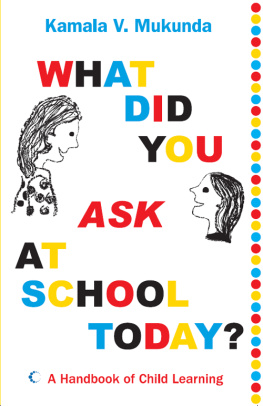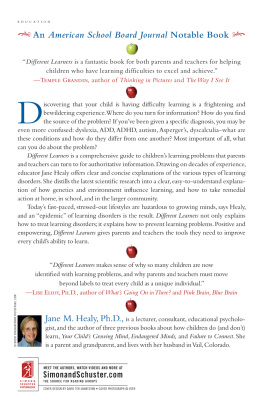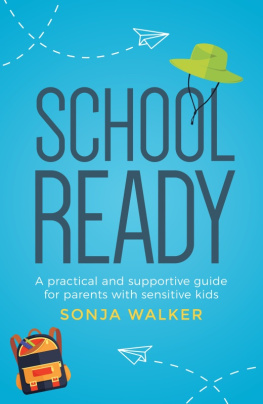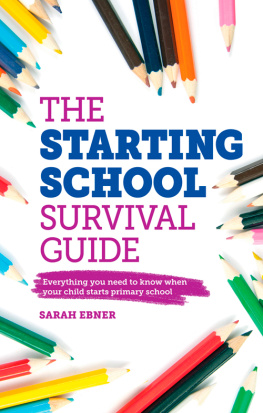1
SCHOOL: THE SHOE
THAT NEEDS TO FIT
Why do so many children now struggle to learn, especially when it comes to particulars like detailed directions, rules of grammar and spelling, and math facts? We need better explanations than naming and blaming our children for having deficiencies. Could it be that to a degree, our mind-set and educational format have outlived their usefulness? Every day we expect children to adapt to our way of thinking. Is it time to update our thinking and be more open to the potential of theirs?
Lucy Jo Palladino, The Edison Trait
I was standing outside the Chip n Dale play area at Disneyland, watching as the children inside screamed with delight, enthusiastically jumping and racing around. One father who stood beside me seemed agitated, and kept calling out to his son, trying to get him to calm down. After several attempts to get his sons attention, the dad turned to me with an exasperated look on his face and said, See what we get when hes off his Ritalin?
I must have looked more surprised than supportive, because he quickly moved away so he could retrieve his son. I wanted to remind this frustrated father that this was Disneylanda place where kids are expected to be excited and energetic.
The sad truth is that more and more children are expected to be calm and obedient regardless of the circumstances, and the diagnosis of and medication for learning and attention deficit disorders is becoming more and more popular, even for very young children. Recent studies have shown that seven to ten percent or more of Americas school-age children are being prescribed stimulant drugs to control their behavior, and the actual figures may be higher. The percentage of boys being drugged is disproportionately large and probably reaches or exceeds fifteen to twenty percent. Some drug advocates believe that eight million of Americas children should be taking some kind of psychiatric medication. For 1997 the DEA authorized 13,824 kilograms [of Ritalin], an increase of more than seven hundred percent since 1990.
When my first book, The Way They Learn, was released over ten years ago, it was received with great enthusiasm. Parents and teachers all over the world embraced the idea of discovering each childs individual learning strengths and focusing on strategies for bringing out the best in each student. These learning styles include traits that can be very inconvenient for a standard classroom or an intolerant adult. Many children need movement and physical activity to be at their best; others need to verbalize their thoughts and talk their way through tasks. Virtually all children need to experiment with the discovery process of learningand that can be messy. Strong-willed children challenge authority to establish boundaries and parameters, and they seldom just meekly obey. As they grow through the different stages of their lives, children can be noisy and irritating and full of questions. They can annoy and frustrate adults who prefer to keep situations calm and stay in control. Anyone who is involved in working with children knows these statements are true. Unfortunately, many adults who do work with children seem to have forgotten that we cannot expect to effectively teach and nurture the younger generation if our focus is on keeping circumstances and outcomes convenient for us. Especially when it comes to education, we are not the customerthe student is the customer. And yet, in my almost two decades of working with parents and educators, there is a growing concern that instead of truly identifying and meeting the needs of students, society in general and the educational system specifically is choosing to medicate them into the kind of conformity that is most convenient for the adults who teach them.
There are children who have very legitimate physiological and neurological disabilities. But for every one of those children, what if were putting ten other normal but inconvenient children in the same group? The children who truly need the professional attention have their treatment diluted by those who suffer the fate of being misdiagnosed and categorized as learning disabled or behavior problems.
It becomes even more alarming when you consider the fact that once students graduate from their K-12 education, they usually get hired for the very things they got in trouble for when they were in school. Human resources managers have a few very consistent requirements, regardless of the type of position they are filling. The best applicants should have good social interaction, independent thinking skills, and a high energy level, among other things. If you think about it, we not only dont foster those traits in school, we often actively discourage them. If we are spending a great deal of time diagnosing and medicating students so they can conform to a classroom situation that becomes virtually irrelevant after its over, whats the point?
I am not advocating a permissive and lenient education system. I do not believe we should lower academic standards or compromise when it comes to good behavior. I am totally committed to accountability. But what is it we are trying to measure? Have we actually asked and answered this important question: Whats the point? If we simply demand that students do what we tell them and work hard because they have to, how many will want to keep on learning when the required formal education is complete?
When I take my children to the shoe store and the shoes dont fit, I cant change their feet. They do need to wear shoes, though, so we keep shopping until we find the shoes that fit their feet. What worries me about education is that from the very beginning we have offered very few styles of shoes. When a childs foot wont fit the shoe we offer, we insist that the foot be changed. But what happens when you force a childs foot into uncomfortable and ill-fitting shoes and make him walk around in them? As soon as he possibly can, he takes the shoes off, vowing never to put them on again I cant count the times I have had mature and capable adults come up to me when I was doing a corporate workshop and say, Look, I know Im stuck in a boring, dead-end jobbut Id rather stay here forever than go back to school. They remember quite well what those shoes felt like, and they have no desire to put them on again. Companies spend millions on training programs and many even provide financial incentives for employees to get college degrees. And yet so many adults have vivid memories of being in a classroom, feeling stupid or overwhelmed with tasks of concentration and memory they are ill-equipped to undertake. If the formal process of education is mostly a dreaded chore to be done or is tantamount to a prison sentence to be served, why should we be surprised when each successive generation becomes less and less interested in applying themselves to the task of learning? How can we justify making children suffer a boring and sometimes even painful educational experience if the end result is that they never want to learn again?
We do need educational reform, but most of all we need to remember who we are trying to educate. The students should be our first priorityeach child should be considered an important and valuable customer who can potentially change the world for the better. We should keep our standards high, our academic goals clear, and our code of ethics strong. The point









